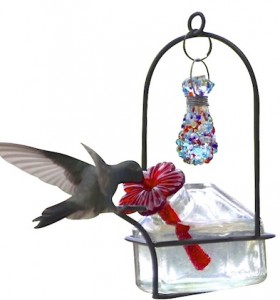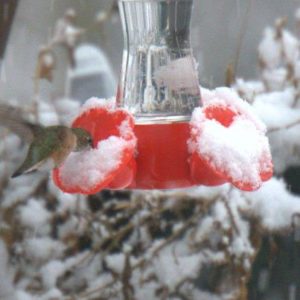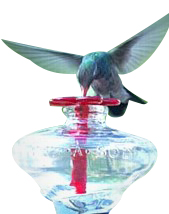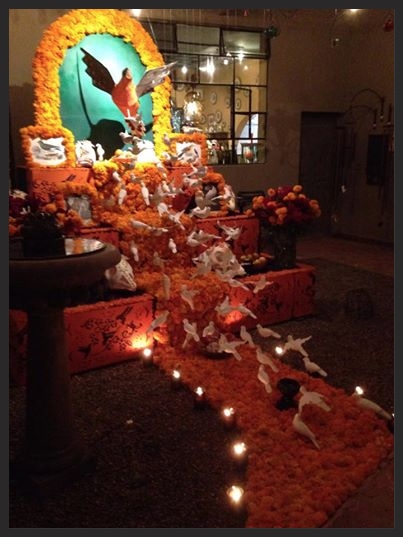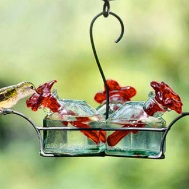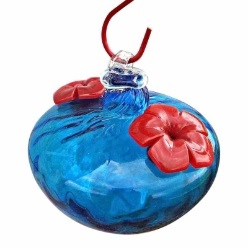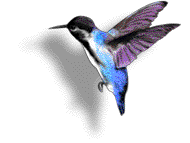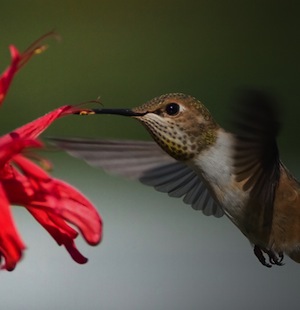-
Partial to Parasol Over Bird Brain Hummingbird Feeders
Gift idea # 45: Get someone hooked on hummingbirds!
First and foremost, the Hummingbird Society recommends leaving at least one feeder out for stragglers or the occasional sprite who doesn’t head south! Wintering along the East coast, several birds have been documented enduring tough weather in the Northern hemisphere- and their dedicated hosts who manage to keep nectar from freezing!
Although the company is now defunct, Bird Brain hummingbird feeders are still around, but we’re partial to the elegance of Parasol’s feeders instead.
Both made from recycled glass, the ones made in Mexico are better quality than what comes from overseas. Their designs are unique, and Parasol’s love of birds shines through not only in their product offerings, but community involvement with raising awareness and conservation of the species.
In heir latest newsletter, the Mexican tradition Day of the Dead was explained and how Parasol was involved with the annual fall celebration. Their altar theme was dedicated to Martha, the last passenger pigeon. She died 100 years ago in a zoo after spending many years in captivity. Once an overly a
bundant bird, the passenger pigeon became extinct in a period of one hundred years due to indiscriminate hunting.
Martha is considered a symbol of the threat that humans pose for some species, and that’s why Parasol honored the centennial of her death and its relevance with their Day of the Dead altar. Several hummingbird species are currently listed as critically endangered, and The Birdhouse Chick is a proud business sponsor of The Hummingbird Society. A portion of proceeds from each hummingbird feeder sold goes towards the society’s ongoing conservation efforts.
-
Good Luck with Parts for Bird Brain Hummingbird Feeders
They were really great feeders, so it’s sad the company’s no longer around. Trying to find replacement parts for the old Bird Brain hummingbird feeders could pose quite the challenge. A recent customer would absolutely attest to this fact.
Even their feeders with the rubber or plastic flowers… nada, zip, zilch, replacements just don’t exist.
But wait… the light bulb goes off and it’s a brainstorm for Bird Brain. Parasol! Yes some Parasol’s feeders use a red glass flower with a long stem. But will they fit correctly? The only way to know is try and see. So with said customer on the phone, one glass hummingbird feeder from each company was pulled to experiment.
It worked – like a charm too! The glass flowers actually looked better than the original parts. Even with the stem a little bit shorter, it doesn’t have much bearing as hummingbird’s tongues are twice as long as their beaks. Sometimes there’s concern that the feeder port doesn’t reach to the bottom of its vessel, but truth is, it’s not required.
Even their styles with rubber feeder ports (which had no stems at all) will accommodate Parasol’s feeder tubes beautifully. Doh… forgot to photograph the new combination!
So you’re actually in luck if searching for Bird Brain feeder port replacements, because Parasol’s work great!
By the way, if there’s been a lull at your hummingbird feeders you’re not alone. Many people are saying the same thing. It could be the sprites are nesting, or maybe there’s just not as many this year? In either case… they’re back! We spotted several last week, and our local bird buddies said the same thing. So it’s time to clean your feeder and be sure nectar stays fresh. And in about one more month, prepare to be dazzled when their migration begins.
You may even need to another feeder!
-
Bird Brain Hummingbird Feeders for Citizen Science
Audubon Invites Volunteers to Help Track Hummingbirds This Spring
Take your hummingbird feeders a step further by helping Audubon track the tiny sprites this season. All habitats and feeders are welcome; from the old bird brain hummingbird feeders to honeysuckle and trumpet vine to colorful annuals providing food…. watch near fountains too, another favorite of this flying jewel!
NEW YORK, NY (April 1, 2014) – With spring officially upon us, the National Audubon Society invites birders and nature enthusiasts across the country to help track the health of hummingbird populations with Audubon’s Hummingbirds at Home app. This citizen science project utilizes the power of volunteers to compile data at a scale that scientists could never accomplish alone.
Every spring, numerous hummingbirds migrate long distances and must eat several times their weight in nectar daily to stay alive. Hummingbirds visit our yards every year, looking for nectar from our gardens and feeders. As flowers bloom earlier because of warming temperatures, the impact on hummingbirds which rely on nectar could be significant. The degree to which hummingbirds are able to adapt to accommodate these changes is not completely understood. Hummingbirds at Home was designed to bolster current research by collecting data from volunteers across the country that offers important insight on the effects of climate change and the birds’ well-being.
“Increasingly people are seeing the impact of climate change in their own backyards, from early blossoms to extreme weather,” said Dr. Gary Langham, Chief Scientist at Audubon. “This is a fun, family-friendly citizen science project that works in the classroom or in the kitchen.”
Hummingbirds at Home differs from other bird monitoring programs in that the focus is on recording the species, nectar sources, and feeding behavior observed. In the case of bloom timing mismatches, Audubon hopes to eventually learn if alternate nectar sources, like feeders, make a difference in hummingbird breeding success and survival.
Participants can get involved by spending a few minutes as frequently as they wish to collect invaluable data from feeding areas in their gardens and communities. Audubon’s Hummingbird at Home app makes it fun and easy. There is no cost to participate and using the free mobile app or website makes it simple to report sightings and learn more about these remarkable birds. For more information visit, www.hummingbirdsathome.org.
About Audubon
The National Audubon Society saves birds and their habitats throughout the Americas using science, advocacy, education and on-the-ground conservation. Audubon’s state programs, nature centers, chapters and partners have an unparalleled wingspan that reaches millions of people each year to inform, inspire and unite diverse communities in conservation action. Since 1905, Audubon’s vision has been a world in which people and wildlife thrive. Audubon is a nonprofit conservation organization. Learn more at www.audubon.org and @audubonsociety.

